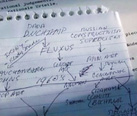
The fabulously energetic Mark Williams at the NZ Film Archive is poised to screen the documentary essay Conceptual Paradise: There Is a Place for Sophistication. Unfortunately this screening is in Wellington, NZ, not much good to us at present but maybe someone in the community will be spurred to show it! Hope so!
The film is directed by Stefan Römer traces out the debates that allowed the intellectual art movement of conceptual art to emerge in the 1960s, and which has subsequently led to the most relevant questions in contemporary art.
As Mark’s e-mail today said, it features some of the most interesting and dynamic artists and art theorists alive today, presenting a diversity of voices to show conceptual art as a socio-historical development of various movements; that it has no one valid definition. Yet there are several ideas that are framed throughout the documentary; the fiction and ideal of art as political engagement; the history of art as a history of struggles around strategies of representation, and, in making a film about conceptual art, the trope of reflexivity that produces a study on the documentary as a genre in itself.
Artists:
Vito Acconci, Art & Language (Michael Baldwin, Mel Ramsden), Michael Asher, John Baldessari, Robert Barry, Hartmut Bitomsky, Mel Bochner, Gregg Bordowitz, Klaus vom Bruch, Daniel Buren, Victor Burgin, Luis Camnitzer, Jan Dibbets, Mark Dion, Sam Durant, Valie EXPORT, Stano Filko, Andrea Fraser, Liam Gillick, Dan Graham, Renée Green, Shilpa Gupta, Hans Haacke, Július Koller, Joseph Kosuth, Sonia Khurana, David Lamelas, Sol LeWitt, Thomas Locher, Marcel Odenbach, Yoko Ono, John Miller, Adrian Piper, Yvonne Rainer, Allen Ruppersberg, Ed Ruscha, Martha Rosler, Allan Sekula, Peter Weibel, Lawrence Weiner, Stephen Willats, Heimo Zobernig
Curators/Theorists:
Alexander Alberro, Benjamin H.D. Buchloh, Sabeth Buchmann, Charles Harrison (Art & Language), Geeta Kapoor, Geert Lovink, Seth Siegelaub, Gregor Stemmrich.